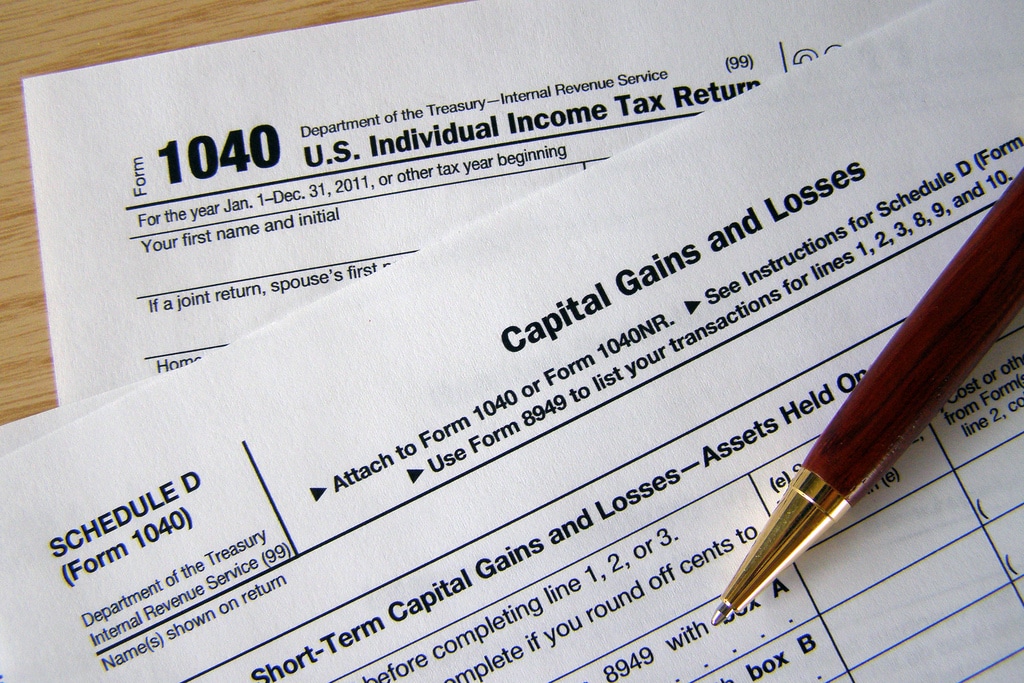
(Courtesy: Flickr)
Following the Democrats’ unexpectedly thorough victory this past election day, where the party won almost every competitive race, the congressional Republicans found themselves in an unexpected position, of losing part of their base. Desperate to pass their first major piece of legislation before the 2018 midterm election season begins, the congressional Republicans are eyeing an aggressive tax reform package as their key to validating the Right’s faith in them.
The competing versions of the tax proposal — the Senate version was released on November 9, with the House version being released a week prior — will both reduce taxes on average for all income groups, per analysis by the Tax Policy Center. However, with the top two quintiles by income receiving 78.7 percent of all total federal tax and those in the bottom two quintiles seeing less than a 1 percent change in their average after-tax income, the House proposal is specifically designed to appease wealthy and corporate campaign donors. The House tax proposal will yield $6.2 trillion in tax savings over the next decade, with 47 percent of this going to the top 1 percent.
In contrast, the tax proposal proposed by 2016 Democratic presidential nominee Hillary Clinton would have raised taxes $1.4 trillion over a decade, with the wealthiest 1 percent — those with cash income in excess of $699,000 — paying for 92 percent of this. The lowest two quintiles would have received the greatest benefits under this plan.
African-Americans — particularly, poor African-Americans — are likely to be hit hard by these tax proposals. While the impact will be less than that of the proposals Donald Trump originally called for in 2016, the effect of these possible changes stand to exacerbate poverty rates, increase the wealth disparity gap, and stop Black post-Great Recession recovery dead in its tracks.
The House and Senate plans both call for deep cuts to the corporate tax rate. Republicans have for years made the claim that the corporate tax rate is too high and that it is strangling the nation’s competitiveness in world markets. The Organization for Economic Cooperation and Development argues that it is true that the United States does have the highest corporate tax rate, but only if you are looking at the statutory rate.
As the United States uses a deductions-based tax system, the statutory rate represents only the most one can pay, without fine or other penalties. In reality, the average effective corporate tax rate, per OECD, is only 18 percent — below Argentina, Japan, and the United Kingdom and two percent lower than the twenty percent rate proposed by the Republican proposals.
A key philosophy in Republican tax bill writing is “broaden the base, lower the rate,” which can be translated into a push to lower the statutory rates while limiting or closing loopholes that affect the effective rate. In other words, the strategy behind the Republican proposals is to have those that would pay the 20 percent statutory rate actually pay 20 percent corporate income tax — which would be a tax increase for most businesses.
This push to bring the statutory and effective rates in line extend to income taxes, as well. The Republican proposals opt to eliminate most deductions, including elimination of the state and local tax deduction, a reduction of the mortgage interest deduction (the House limits it to the first $500,000 of a property’s cost, the Senate to the first $1 million), and an elimination of the dependent deduction (this will be met with an increase in the child tax credit and the standard deduction). Also to be affected is the estate tax (the House wants it fully eliminated, the Senate wants to double the threshold for the tax). Since the bill was introduced, the House bill has undone the elimination of the adoption tax credit.
Beyond the obvious that such proposals would punish those that itemize their taxes in states with heavy state tax burdens — which are typically blue states, like New York and California — and taxpayers that have more than two children (African-American families are more likely to have four or more children than white families), these deduction eliminations may have a deeper implication.
Take renting, for example. African-Americans outpace all other races in regards to households that pay rent for their primary residence. As of the third quarter 2017, 42 percent of African-American households owned their home, compared to 72.5 percent of non-Hispanic whites, 46 percent of Hispanics, and 57.1 percent of all other races, per the U.S. Census Bureau. Aggressive home lending policies and a post-Great Recession recovery have had minimal effect on increasing the home purchasing rates for Black homeowners over the last ten years.
This is troubling when taken with the news that the average African-American household in 2016 paid 44 percent of their take-home income in rent, a four-point increase from five years earlier. A study by Zillow showed the average income for Black households over the same period of time only increased by 2.9 percent, compared to a 5.4 percent rise in white communities. In white communities, the average cost of rent is about 31 percent.
This is causing an affordability crisis. As more African-American families must pay more for housing, they can save less to actually buy their own homes. This ensures that more Black households stay renters longer. “African-American and Hispanic renters find themselves in a catch-22 situation — while owning a home is a great way to build wealth, you need to save up some cash to be able to buy. If you’re spending close to half of your income on rent, saving up that down payment is going to be incredibly difficult,” Dr. Svenja Guedell, chief economist for Zillow, said in a press release.
Per Harvard University’s Joint Center for Housing Studies, more than 11 million American households spend more than 50 percent of their take-home income in rent.
A little-reported element of the Republicans’ tax proposal threatens to exacerbate this problem. The Senate bill seeks to protect the Low-Income Housing Tax Credit that the House bill seeks to limit. The Low Income Housing Tax Credit is singularly the nation’s chief engine for affordable housing investment. The credit gives a dollar-for-dollar tax credit for the development of affordable housing for Americans with low incomes. Roughly 90 percent of all affordable housing construction in the United States is funded in part through the Low Income Housing Tax Credit.
The push for a 20 percent corporate statutory tax rate will effectively dry out the low-income housing funding industry. The House bill eliminates the tax exemption on private-activity bonds — the primary way municipalities and states pay for LIHTC projects. These are tax-exempt bonds that can be offered by a governmental agency to a private developer for qualifying projects. The elimination of these could mean the elimination of 60,000 affordable houses built or rehabilitated per year.
Even though the Senate bill protects PABs, the 20 percent corporate tax rate still hinders the effectiveness of LIHTC funding. “It would be a catastrophe,” Bob Moss, principal and national director of governmental affairs at CohnReznick, told Affordable Housing Finance. “In New York alone, housing advocates project that [the state] will lose $4.5 billion in affordable housing investment, 17,000 affordable homes, and 28,000 jobs annually. The national impact of losing 50 percent of production is devastating, at a time when an estimated 25 million Americans are paying more than 50 percent of their monthly income in rent.”
This push to curry political favor before the midterms bears the potential of causing economic calamity for millions. Peter Schaeffing is the president of High Impact Financial Analysis, a top-five national community development finance consultancy. In conversation with Atlanta Black Star, Schaeffing explained that the tax proposals not only have the potential to stop new low-income housing development but slow the development of job-creating commercial properties in low-income communities as well.”
“The tax reform bill would reduce the supply of affordable housing, and slow other development in low-income, distressed neighborhoods,” Schaeffing said. “People of color will be disproportionately affected by the elimination of the historic tax credit, the new markets tax credit, and private activity bonds (which facilitate 60 percent of affordable housing developments using the low-income housing tax credit). These changes would have a devastating impact on communities’ ability to meet the increasing demand for affordable housing, further increasing the rent burden on minority families.”
In real terms, the Republicans’ tax plans have the potential to raise the rent burden on low-income African-American households. This can create a cash crunch that would limit the ability to buy food and other essentials and to have any discretionary spending. This could crater the economy of the Black community, creating a sectored economic depression. Such a scenario would not only make the wealth disparity gap worse but would endanger the health and well-being of millions.
“Americans are especially likely to face a tax increase if they have a smaller family, have mostly wage income instead of investment income, or claim some of the many deductions that the bill repeals, like those for state and local taxes and employee business expenses,” Lily Batchelder, a professor and tax specialist at New York University Law School who worked on economic policy in the Obama administration, told the New York Times. “They are increasing taxes on many in the middle class while concentrating their tax cuts on the wealthy.”
With Senate Majority Leader Mitch McConnell admitting that the Senate’s tax proposal will raise taxes for some in the middle class, and with most conceding that the Senate bill is the more compassionate of the two towards non-wealthy taxpayers, one must ask who exactly do the Congressional Republicans serve?
“If the tax proposals go through, it will lead to stagnation in low-income housing construction, among other things,” Schaeffing added. “As the demand forlow-incomee housing has not been met, this can lead to increases in poverty and homelessness, with the most at-risk populations being the first to lose.”
